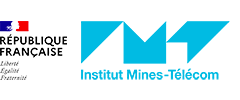IMT consolidates its strategy on MOOCs and enters a new phase
IMT is ramping up its activities based on the MOOCs that were acclaimed by students and professionals alike during the lockdown period, and which it is now seeking to incorporate into certificates and a program-based approach.
Institut Mines-Télécom, which pioneered the use of MOOCs in France with its first course available in 2013, is continuing to develop and adapt this provision for students and professionals seeking to update or acquire new knowledge. The relaunch of archived MOOCs during the health crisis illustrated the success of this system. IMT is enhancing its collection of MOOCs, which it plans to incorporate into certificates and is creating training programs – an indispensable asset for the start of the academic year in the event of lockdown, and for international students who may be prevented from traveling. This MOOC formula also meets the needs of professionals supporting digital transformation in their companies or wishing to change their career path.
Keen interest in MOOCs
At the start of the lockdown period, IMT engaged in several initiatives to ensure academic continuity for its students and reach a vast number of learners in the performance of its public-service missions.
Today, the IMT collection has 40 MOOCs, 10 of which were relaunched to meet the increased and urgent needs for distance learning in March. This led to a total of 110,000 new enrollments during the first 5 weeks of lockdown – tripling the previous year’s figures for the same period. Agnès Pannier-Runacher, Secretary of State to the Minister for the Economy and Finance, has commended these results, which demonstrate the relevance of the online courses offered by IMT. This collection enables students to follow distance-learning programs at their own pace, during their studies, and throughout their career.
In this way, the MOOC on Digital Transformation for Companies and Industry of the Future has reached more than 7,000 people, two thirds of whom are working or job-seeking professionals.
IMT is going from strength to strength and increasing its presence on the different MOOC platforms. It is also seeking to facilitate access to these platform-based resources.
- On fun-mooc
IMT responded an appeal by the platform by making 30 MOOCs available over the period, which attracted more than 77,000 new enrollments over the period, 3.5 times more than in the previous year.
- On edX
edX launched its “Covid-19 Remote Access Program” initiative to allow students to enroll free of charge (until June 30) on MOOCs leading to certificates. This led to a fourfold increase in the number of enrollments on IMT MOOCs, corresponding to 30,000 new enrollments, in absolute terms.
- On Coursera
IMT is engaged in negotiations with the platform to extend its students’ access to the catalog of 3,700 available courses. In particular, new tools could enable IMT faculty members to design learning pathways by combining resources created in-house and others designed by world-class universities that are also partners of Coursera.
Creation of new MOOCs
IMT is currently working on the production and design of some twenty new MOOCs, including three new certificate programs to cover subject areas such as Networks, Computing and Programming, Digital Technology and Business, the Circular Economy, Blockchain, Digital Manufacturing, the Internet of Things and Cybersecurity.
Industry of the Future will be addressed by two MOOCs currently being created by IMT and TUM (Technische Universität München) at the Franco-German Academy for the Industry of the Future, co-founded by the two institutions.
The development of the IMT’s collection and its dissemination on major platforms (Coursera, edX, Fun-Mooc,) has been made possible by support from the Patrick and Lina Drahi Foundation, which sponsors IMT’s MOOC program, in particular.
Creation of learning pathways
The subject areas chosen for the creation of these new online courses are fundamental to IMT’s identity and its missions relating to three transitions: digital, industrial, and ecological. The constituent educational resources are designed by teams of faculty members, each operating in their specialist field and according to their academic needs and objectives.
These different resources will be added to an academic library designed to facilitate the implementation of internal learning pathways at IMT. Faculty members will be able to select resources from this library to design learning pathways and define how they will be used according to their students’ needs: flipped classroom, acquisition of basic knowledge before starting a practical session, development of general knowledge about a subject, etc.
The creation of learning pathways is also intended to ensure academic continuity in the event of a new lockdown or for international students who may be unable to travel, by granting equivalent university credits for each certificate obtained, or by combining MOOCs with assessments conducted on internal resources.
More generally, certificate-based MOOCs confirm the acquisition of competencies in specific areas of expertise and train students and professionals to enter in-demand professions or those with recruitment difficulties.


















